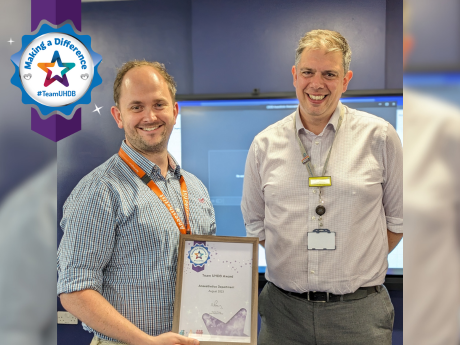Praise for Anaesthetics team after project helps save more than 1,000 tonnes of CO2 emissions each year

Colleagues whose innovation has led to a huge reduction in the use of an anaesthetic medication with a high carbon footprint have been praised for their work to reduce its use.
Desflurane is a volatile anaesthetic medicine used to keep patients asleep during operations, but has a global warming potential of around 2,500 times greater than that of carbon dioxide. Safe and appropriate alternatives are available which are less damaging to the environment, but switching to their use has been a long and complex journey.
However, thanks to the hard work and commitment of the Trust's Anaesthetics team, spearheaded by Anaesthetic Registrar, Dr Alex Churton, the use of desflurane has been reduced dramatically since 2022 - vastly reducing the amount of CO2 produced by the Trust while continuing to provide safe and effective anaesthesia to patients.
Now, the team's incredible achievement has been recognised as they have been presented with our latest Team UHDB Monthly Making a Difference Award.
Dr Churton, who is currently on rotation at Nottingham University Hospitals NHS Trust, returned to UHDB to accept the award on behalf of the team and expressed his pride at the team's achievement:
"This has been a really challenging and complex project to tackle, but the results speak for themselves. Reducing desflurane use has so many benefits and it's a real testament to the team for making such a seismic shift in practice."
Work to reduce the Trust's use of this form of anaesthetic gas has been underway for several years, but in the last year, this work has accelerated and seen huge improvements.
In March 2022, desflurane made up 21.2% of the total amount of inhaled anaesthesia, which reduced to just 6.1% a year later. But the team continued to make further improvements, and by July 2023, desflurane was no longer used across the organisation.
The environmental impact of the eradication of desflurane is also significant. The gas accounted for almost 1,247 tonnes of CO2 emissions at UHDB in January 2020, with this now completely removed from the Trust's carbon footprint.
Developing a decarbonisation plan as part of our goal to achieve net zero carbon emissions by 2045 is one of the Trust's 10 key priorities for 2023 / 24, and this improvement shows further progress towards achieving this goal.
Dr Churton added: "I am incredibly passionate about the impact that we as clinicians – and as an organisation - can have not only on our patients but also on the planet, and this was something I was really keen to help the Trust to improve on. To see the environmental benefits this work is now providing is incredibly satisfying - made even more so by the fact that patients are still receiving the same standard of care.
"This has been a complete team effort and everyone has worked so hard providing an effective collaborative working environment to achieve such a significant result of removing desflurane. This stretches beyond the Anaesthetics team, with colleagues from theatres, clinical engineering and pharmacy all playing crucial roles."
Natalie Roddis, Environment and Sustainability Officer at UHDB, praised Dr Churton's input, saying his clinical knowledge has been pivotal in making such drastic reductions in the use of desflurane.
She said: "As a Trust, we previously had very high usage of desflurane, and without the clinical background to understand why we’re using it, it was difficult for me to advise as to how to reduce this.
"Alex's input has been instrumental in reducing our use of this anaesthetic gas, and in the last year, we've gone from it being a big contributor of our emissions to saving this entirely - which is a remarkable turnaround and is a real testament to the entire team.
"This is a really good example of working together across different teams, departments and specialist areas, to keep making a difference."
The impact this will have on the Trust's carbon footprint is substantial, and colleagues in trusts across the country are now looking to UHDB for inspiration of how to make similar changes.
Natalie added: "It really is outstanding work, and now we as a Trust are being asked by other organisations how we've achieved such amazing results and are a standout organisation regionally.
"As a Trust, we are doing all we can to reduce our emissions and work towards our goal of achieving net zero emissions by 2045, and initiatives and projects like this will really help us to continue on this path, so I'm really grateful to Alex and the team."
Andrew Hall, Deputy Chief Operating Officer at UHDB, presented the award to Dr Churton and the whole of the Anaesthetics team at a divisional training day, and expressed his gratitude for their hard work:
"This really is brilliant work and I'm delighted to have been able to recognise the work of Alex and the team in achieving this feat.
"The decarbonisation opportunity from desflurane is something we've been aware of as an organisation for a while. Achieving the reduction has required a massive cultural shift, so the fact it has been achieved so dramatically is a real achievement in focussing on an issue working together to address it."
